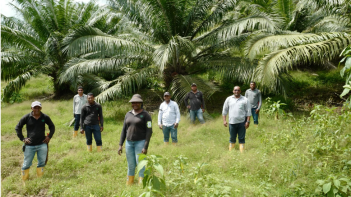The concept of Shared Responsibility has been discussed and agreed upon for a number of years among RSPO members. Shared Responsibility is the set of commitments that RSPO members must adhere to in order to achieve RSPO’s vision “to transform markets to make sustainable palm oil the norm”. In 2019, the Board of Governors endorsed the ‘Shared Responsibility Requirements and Implementation’ document.
To whom do the Shared Responsibility requirements apply? The Shared Responsibility (SR) requirements apply to RSPO Ordinary members: Environmental NGOs (ENGOs), Social NGOs (SNGOs), Banks and Investors, Retailers, Consumer Goods Manufacturers (CGMs) and Processors and Traders (P&Ts).
Excluded from the SR requirements are growers who do their part through RSPO Principles and Criteria (P&C) certification, and Ordinary members that only hold a traders or distributor license.
Key topics of the Shared Responsibility requirements The SR requirements reflect the unique roles of different member categories to help make sustainable palm oil the norm. Two key topics of the requirements are to have a set of policies in place and yearly uptake volumes.
1. Policies and plans
A set of policies and plans are required to be in place and/or be publicly available in all membership categories. Some of the required policies and plans are presented below, the exhaustive list can be found in Annex 1 of the ‘Shared Responsibility Requirements and Implementation’ document.
|
Policies |
Plans |
|---|---|
|
|
2. Volumes
In order to drive uptake and transform markets, the volume requirements for supply chain actors include percentage point uptake targets year on year. Percentage uptake targets for Certified Sustainable Palm Oil (CSPO) and Certified Sustainable Palm Kernel Oil (CSPKO) for 2021 are presented below.
|
Membership category |
CSPO |
CSPKO |
|---|---|---|
|
Processors and Traders (P&T) |
2% |
NA |
|
Consumer Goods Manufacturers (CGM) |
12% |
7% |
|
Retailers (RT) |
12% |
7% |
The FAQ includes an example on how to calculate the baseline and the uptake targets in volumes.
If you have any questions, please contact [email protected].
Keep reading

Access into prisma

10 Years of RSPO in China: Driving Palm Oil Transformation Towards Sustainability

Updated Trace Function in prisma

Call for Expression of Interest: Independent Investigation of a Complaint

Latin American Smallholders, Key Global Brands Gather in Peruvian Amazon to Advance Sustainable Palm Oil

RSPO Forum for Members and Certification Bodies 2025: Strengthening Capacities and Building Bridges with RSPO Members

From Violence to Prosperity: Cultivating Sustainable Palm Oil in San Pablo, Colombia




